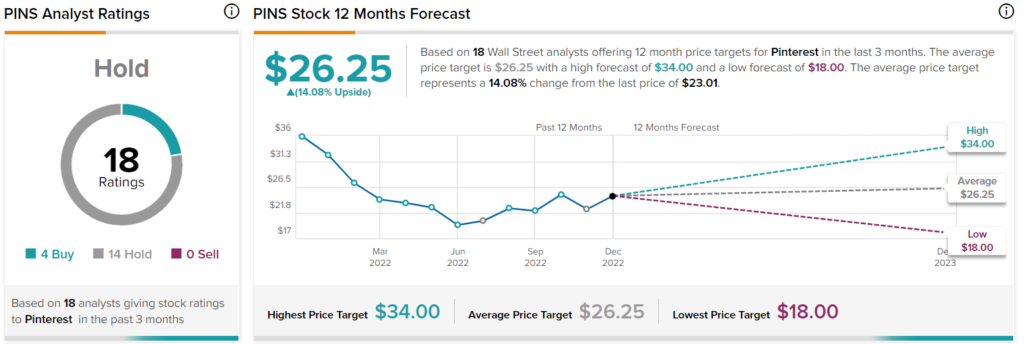Pinterest (NASDAQ: PINS) is kind of special among its “social media” peers precisely becomes its platform is completely different from most social networks. With creative ideas monopolizing its content, the company does not face any of the privacy/scrutiny issues that, say, the giant in the space Meta Platforms (NASDAQ: META) suffers from. This is why I liked the company and was bullish on the stock up until recently. However, Pinterest has failed to meet my expectations in terms of starting to produce sustainable profits. For this reason, I am now neutral on the stock.
Invest with Confidence:
- Follow TipRanks' Top Wall Street Analysts to uncover their success rate and average return.
- Join thousands of data-driven investors – Build your Smart Portfolio for personalized insights.

Why Was I Previously Bullish on PINS Stock?
To answer this question, we need first to establish the fact that Pinterest draws a seasonal user base rather than a regular user base that logs in on a daily/monthly basis, which is the case with most social media platforms. Because Pinterest is an idea-sharing platform, users come and go for different reasons which cannot be predicted. For instance, some may be glued to Pinterest while they are gathering ideas about how to renovate their house but then not log in for two years.
With that in mind, my idea was that if Pinterest manages to retain a somewhat constant number of users at any given time (some leave, others come back) but manages to increase its ARPU (average revenue per user), revenues would grow, and with scale due to its lean business model, growing profits would also follow. Thus, I could still be bullish on the stock even if Pinterest’s MAUs (Monthly Active Users) were to be stagnated.
What Has and Hasn’t Worked?
Well, technically, I was right in that Pinterest could maintain a relatively constant user base even as some of the individual users were rotating in and out. In its Q3 results, the company recorded 445 million global MAUs, which was exactly flat year-over-year and, in fact, up 3% sequentially.
I was particularly happy to see that Pinterest’s global mobile app MAU growth actually accelerated to 11% compared to last year and that U.S. and Canada mobile application users grew 3% year-over-year, illustrating upbeat growth for the first time in 2022. This is quite encouraging because mobile application MAUs comprise north of 80% of Pinterest’s total impressions and revenues.
However, the situation wasn’t so optimistic on the second part of my initial idea, which assumed that Pinterest actually grows its ARPU somewhat rapidly. Global ARPU did expand by 11% to $1.56, which boosted total revenues by 10% year-over-year to $684.5 million, but that’s just not enough to get the bottom line moving higher – especially considering total expenses jumped by 41% to $754 million.

I honestly don’t know what’s worse, the fact that ARPU failed to grow meaningfully or that an idea-sharing platform records more expenses than revenues. Does Pinterest really need to spend $754 million per quarter to operate while most firms strive to cut costs wherever possible? That 41% spike was brutal.
Can ARPU Growth Accelerate, Moving Forward?
Moving into 2023, Pinterest’s management believes the platform can maintain a stable MAUs base while growing its ARPU. In the Q3 earnings call, management mentioned that ARPU growth is likely to be powered by strategic actions in areas like shopping, making more of the content that users find on the platform interactive and actionable and bringing increasingly relevant content to users.
Then again, these “drivers” are entirely vague and don’t point to any specific numbers. Further, does it even matter if ARPU growth accelerates to, say, 15% or even 20% when Pinterest seems to hardly be able to contain its expenses from rising, let alone keep them stable?
Is PINS Stock a Buy, According to Analysts?
Turning to Wall Street, Pinterest has a Hold consensus rating based on four Buys and 14 Holds assigned in the past three months. At $26.25, the average Pinterest price target implies 14.1% upside potential.

Takeaway: Pinterest Has Disappointed
Pinterest’s performance has disappointed lately. The company has managed to succeed in retaining a stable user base despite the cyclical nature of its platform. The problem is that Pinterest cannot monetize its user base effectively.
However, that’s not even the biggest problem. I could be patient and bet on ARPU growth gradually accelerating once the ongoing macroeconomic turmoil eases. The biggest problem is the complete lack of thoughtful oversight when it comes to the company’s expenses, which simply do not allow the company to record any positive profits. With no clear plan on how the company could reverse this situation, I have a hard time remaining bullish on the stock.









